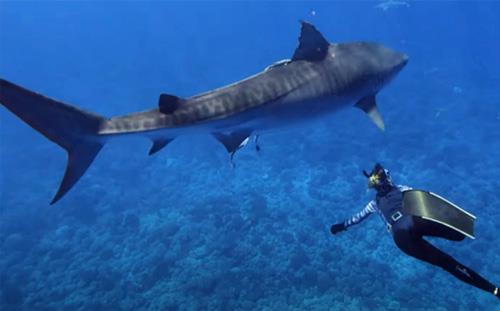
Nat Geo's annual plunge into the world of sharks, appropriately titled SHARKFEST, keeps getting bigger – and yet its core mission remains exactly what it has always been and probably always will be.
It must convince a fascinated public that sharks are more than Jaws and Sharknado. That sharks aren't just the Covid-19 of the sea, a lethal force that could be crashing down on you with any and every wave.
It's an uphill battle. We love envisioning sharks that way, the same as we love envisioning lions and tigers prowling the jungle and Golden Retrievers placing their adoring heads in our laps.
Nat Geo uses its extensive resources, which set a high standard in nature photography, to go out and film actual sharks in their actual habitats, doing the actual things sharks do.
To be honest, of course, they often do end up eating something, which is one reason we'll probably never stop defining sharks by their appetites.
SHARKFEST starts Sunday at 8 p.m. ET on Nat Geo and runs there through Aug. 4. It picks up Aug. 9 on Nat Geo Wild and continues there through Aug. 20.
Fans of shark television should know that the rival shark festival on television, Discovery's Shark Week, also starts Aug. 9. To the chagrin of cinemaphiles around the world, however, the Sharknado film series ended in 2018 and is not being resurrected.
Nat Geo's SHARKFEST includes more than a dozen programs, all aired multiple times.
Things kick off with one of the most impressive shows, World's Largest Tiger Shark? (top), which has that question mark qualifier because who knows what's lurking in the vast swaths of ocean that humans haven't explored yet.
If there's a bigger tiger shark somewhere, you don't want to meet it on your morning swim. Nat Geo photographers get close enough to this one to satisfy any and all curiosity.
The huge tiger shark's competition here is The World's Largest Great White?, which airs at 10 p.m. ET on July 26. The thing with Great Whites is that they don't have to have another superlative like "world's largest" to confirm their reputation as the scariest thing under water.
Nat Geo's SHARKFEST differs a little from Discovery's Shark Week in that it's more observational. It provides information about sharks, but largely by filming them at work.
Raging Bull Shark, for instance, which debuts at 8 p.m. ET on July 26, shows us how the bull shark doesn't just gobble up the first object it sees in the water, but may check it out and even bump up against it before deciding if it will be the house special that day.
There's plenty of action, as you might surmise from the show at 10 p.m. ET on Monday subtly titled Sharks Vs. Dolphins: Blood Battle. (Sadly, some beachgoers on Long Beach Island, NJ recently witnessed this battle close to shore.)
Thankfully, the episode titled Shark Vs. Surfer, Aug. 2 at 8 p.m. ET, isn't wall-to-wall combat, since that matchup tends to be a trifle one-sided.
Sharks of the Bermuda Triangle, July 27 at 10 p.m. ET, competes for the most intriguing title with 50 Shades of Sharks, Friday at 10 p.m. ET.
In the end, it's hard to avoid the fact that the most-aired of all the programs is When Sharks Attack, which can be seen eight times on Nat Geo. Its companion program, When Sharks Attack: Deep Dive, airs four times on Nat Geo Wild.
So maybe the message is that while there's always more to learn about sharks, that doesn't mean Jaws had it all wrong.